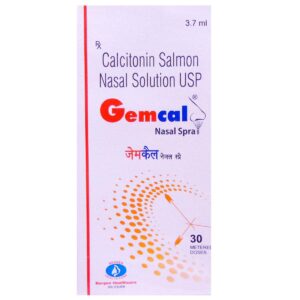CALCITONIN
CALCITONIN: Calcitonin is a drug primarily used for the treatment of osteoporosis and hypercalcemia. It is a synthetic version of the hormone calcitonin, which is naturally produced in the thyroid gland.
The main mechanism of action of calcitonin is to decrease blood calcium levels. It achieves this by inhibiting bone resorption, which slows down the breakdown of bone tissue and subsequent release of calcium into the bloodstream. Additionally, calcitonin promotes the excretion of calcium through the kidneys.
The dose of calcitonin depends on the specific condition being treated. For osteoporosis, it is typically administered as a nasal spray, with a recommended dose of 200 international units (IU) per day. The nasal spray is usually applied to one nostril every other day.
As for side effects, calcitonin is generally well-tolerated. However, some individuals may experience nasal irritation, congestion, or discomfort when using the nasal spray. These symptoms are usually mild and temporary. In rare cases, skin allergies or hypersensitivity reactions may occur. It is important to consult a healthcare professional if any adverse reactions are experienced.
It is worth noting that the use of calcitonin is decreasing due to the introduction of newer medications for osteoporosis, such as bisphosphonates and selective estrogen receptor modulators (SERMs). These drugs have shown to be more potent in increasing bone density and reducing fracture risk.


